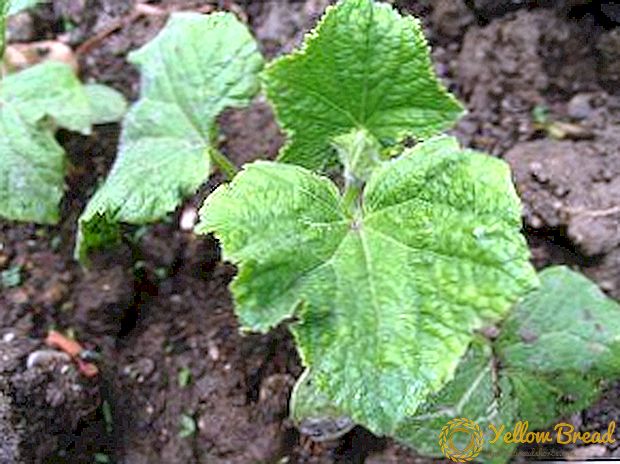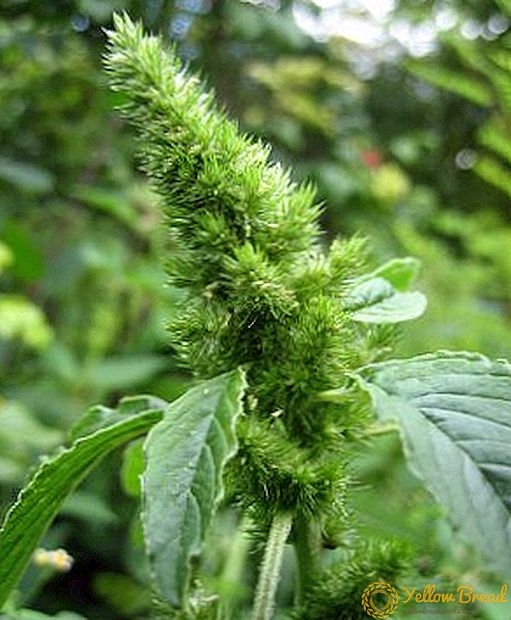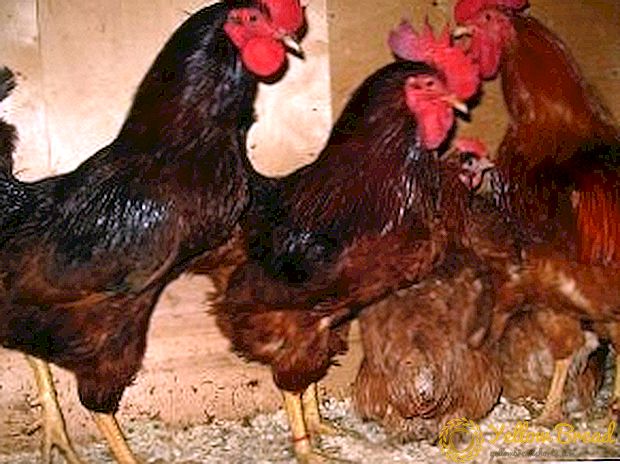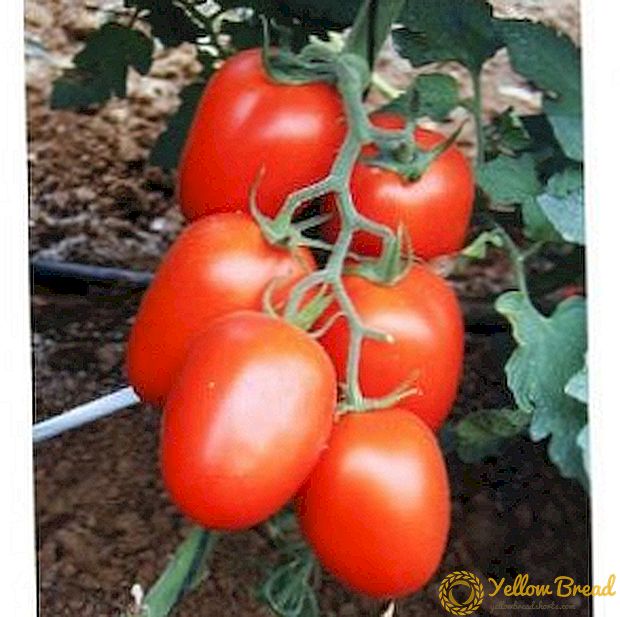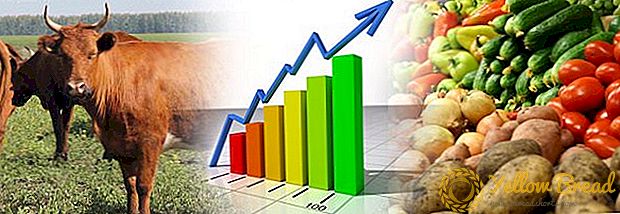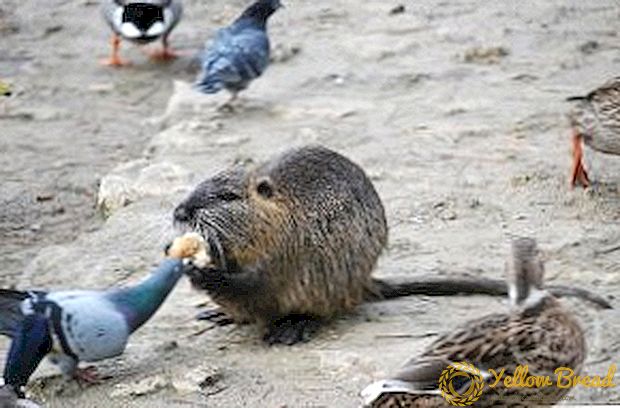 When choosing a potato variety for planting on your plot, it is important to pay attention to precocity, yield, peculiarities of care, resistance to diseases, as well as taste qualities of this popular plant. Potato variety "Gala" meets high characteristics, therefore it is often chosen for your vegetable garden.
When choosing a potato variety for planting on your plot, it is important to pay attention to precocity, yield, peculiarities of care, resistance to diseases, as well as taste qualities of this popular plant. Potato variety "Gala" meets high characteristics, therefore it is often chosen for your vegetable garden.
- History of breeding varieties of potatoes "Gala"
- Description of the characteristics of the potato "Gala"
- Selection and preparation of the site for potatoes
- Preparation of planting material
- Potato planting pattern: depth and distance between holes
- Care and cultivation of potatoes "Gala"
- The abundance of irrigation
- Weeding and loosening the soil
- Hilling bushes
- Fertilization
- Potato resistance of Gala to diseases and pests
- Harvesting and storage of the crop
History of breeding varieties of potatoes "Gala"
Potatoes "Gala" is a young variety, it was bred in Germany at the beginning of the XXI century. The development of German breeders was popular not only at home, but also in other countries. For example, in Russia this potato is registered in the State Register in 2008, and is used most often in the central and northern regions.
Description of the characteristics of the potato "Gala"
According to the description of the term of ripening of the potato variety "Gala", it is an early ripening variety. Full ripening of tubers occurs within 65-70 days after planting.
The yield of potatoes "Gala" - about 25 fruits from one bush.
The bush reaches a moderate height, medium spreading, the color of the stems and leaves is saturated green. The leaves are large, slightly wavy, flowers - white, medium size.  The shape of the tubers is round or oval, the peel is yellowish. The average size is 7-8 cm in length and about 5 cm in width. The weight of one tuber is 100-120 g. The flesh of the potato is yellow or light yellow, it has a dense fibrous structure.
The shape of the tubers is round or oval, the peel is yellowish. The average size is 7-8 cm in length and about 5 cm in width. The weight of one tuber is 100-120 g. The flesh of the potato is yellow or light yellow, it has a dense fibrous structure.
Heat treatment does not lead to the destruction of this structure; therefore, when cooking, the potatoes do not boil soft or darken. Taste qualities of potato "Gala" are at a high level.
Selection and preparation of the site for potatoes
The land for planting potatoes of the "Gala" variety is better to choose on a flat area with good lighting and groundwater at a depth of about 150 cm.
The acidity of the soil should be at a low level so that the potato is more resistant to diseases. Signs of such a soil is the growth of chamomile, clover, coltsfoot or dandelion on it.  In the autumn after harvesting it is necessary to prepare the soil for spring planting potatoes. The site needs to be plowed to a depth of 10-30 cm, introducing in the process of 1 square meter of 5-7 kg of compost or humus, about 40 g of superphosphate, 15 g of potassium sulfate.
In the autumn after harvesting it is necessary to prepare the soil for spring planting potatoes. The site needs to be plowed to a depth of 10-30 cm, introducing in the process of 1 square meter of 5-7 kg of compost or humus, about 40 g of superphosphate, 15 g of potassium sulfate.
Already in spring, the site must again be dug up at the same level as in the fall.This should be done after the soil dries out so that its structure is more uniform.  Along with this process about 20 g of ammonium nitrate are introduced per 1 square meter. In a clay or sandy soil you need to make a bucket of humus or peat also on 1 square meter.
Along with this process about 20 g of ammonium nitrate are introduced per 1 square meter. In a clay or sandy soil you need to make a bucket of humus or peat also on 1 square meter.
Preparation of planting material
An important condition for growing a good harvest of Gala potatoes is preparing the tubers for planting. It is necessary to select small-sized tubers without damage and rot, weighing about 100 g. It is better to use root crops that have grown in the bush with the highest yield.
- The tool that is used to cut the tubers must necessarily be processed with a 5% solution of copper sulfate to avoid infection.
- Cutting should occur only along the tuber.
- On each part of the prepared planting material there should be 2-3 peepholes.
 Most often, for the preparation of potatoes for planting, methods such as wet and dry germination are used.
Most often, for the preparation of potatoes for planting, methods such as wet and dry germination are used.The essence of the first method is as follows: the roots need to be put in boxes and covered with moistened peat or humus. In this form, the tubers should be about a month, the temperature in the room is needed at 15 ° C.
You can choose another method to prepare potatoes, it is called - hardening. The bottom line is that the tubers need to be decomposed in a single layer in a room where the temperature is about 16-18 ° C.  Planting should be carried out after the sprouts appear, and this will happen in 10-20 days.
Planting should be carried out after the sprouts appear, and this will happen in 10-20 days.
The obligatory stage of preparation of potato tubers for planting is their treatment with specialized preparations for protection against fungal infections. To do this, use tools such as immersion for half an hour in a solution of "Taboo" or "Maxim". Prepare a solution of the drug according to the instructions.
Potato planting pattern: depth and distance between holes
Potato tubers are planted in prepared pits, the depth of which should be 10 cm, and the distance between them is 50 cm. At the same time, between 80–90 cm should be left between rows. The pits should be placed from north to south. You can also use a handful of humus or wood ash as an additional fertilizer, putting it in each well. Put tuber need sprouts up, and if it is cut, then place it necessarily cut down. After that, the wells are covered with earth, watered with the calculation of 1 liter of water per 1 bush, and then rake the ground.
Care and cultivation of potatoes "Gala"
After planting "Gala" potatoes, a certain care is needed for it in order for the plant to develop properly and produce a quality crop.
The abundance of irrigation
Watering is carried out at least three times per season, if precipitation is regular. If your weather conditions do not meet this condition, the number of irrigation will increase accordingly. The best time to moisten potatoes is morning or evening.
During flowering potatoes especially need proper watering, and the bed should not be dry at this time.
The first watering should be carried out when the seedlings of the potatoes grow to 4-5 cm. Water should be poured into the middle of the bush, consumption - at least 3 liters per bush.  An adult plant consumes more water - about 8-10 liters during the period when flowering occurs, and after it about 7 liters.
An adult plant consumes more water - about 8-10 liters during the period when flowering occurs, and after it about 7 liters.
If the summer was hot, then the frequency of watering increases to 1 time in 4-5 days, cool weather means that one watering in 10 days is enough.
Moistening of the plot with potatoes stops 10 days before the harvest begins.
Weeding and loosening the soil
The root system of potatoes needs constant access of air, so loosening the soil is important for this plant.
The first time this procedure is carried out 5 days after landing. To loosen the soil around the bushes you need every time during the formation of earth crusts. Weeding potatoes is also important to get rid of weeds that hinder plant development.  The plant in the variety "Gala" closes into a single carpet rather quickly, and up to this point it is necessary to remove the weeds as they appear.
The plant in the variety "Gala" closes into a single carpet rather quickly, and up to this point it is necessary to remove the weeds as they appear.
Hilling bushes
To protect a growing potato from temperature fluctuations, it is hilled. The best time for this procedure is considered to be early morning. If it has rained before or it has been irrigating potatoes, then it is very beneficial for the plant.
Before sprouted potato seedlings form a carpet, hilling is necessary to perform twice - when the stems reach 10-12 cm (they can be completely covered with earth), and then after 2-3 weeks. The plant will already reach a height of 40 cm. At the same time forming ridges about 30 cm in height. 
Fertilization
Potato varieties "Gala" needs two or three supplements for the entire season. The plant responds favorably to both mineral and organic fertilizers.
Fertilizer containing nitrogen (for example, ammonium sulfate, ammonium nitrate) is applied to the first hilling at the rate of 15-20 g per square meter. You can dilute it in 10 liters of water.At the same time about one liter is spent on one bush.
In case of poor growth, it is recommended to water the potatoes with a solution (1:10) from the infusion of fresh manure (prepared 3-4 days).
Potato resistance of Gala to diseases and pests
This potato variety is quite resistant to diseases such as potato cancer, nematodes. However, the plant is vulnerable to rhizoctoniosis. This disease is fungal in nature, affects the lower part of the stem and the root system of potatoes.
The most effective way to combat the disease is prevention, in particular - treatment of the stems with special preparations. It is possible to process the tubers with boric acid before planting.  Also in the "Gala" variety there is a leaf curling virus that infects leaves and tubers. The fruits of this bush can be eaten, but for harvesting seed potatoes it is better not to use it.
Also in the "Gala" variety there is a leaf curling virus that infects leaves and tubers. The fruits of this bush can be eaten, but for harvesting seed potatoes it is better not to use it.
Harvesting and storage of the crop
The Gala potato crop ripens about 70 days, so in the southern areas there is an opportunity to collect two or even three crops, getting from one bush to 25 tubers.
The safety of root crops can be improved, for this you need 10 days before you plan to harvest, completely remove the tops of the plant. As a result, the appearance and taste of the Gala potatoes will last until spring. The peel of this variety is durable, which will help favorable transportation.  Before storage, it is recommended to treat potato tubers with solutions of the “Maxim” or “Baktofit” preparations according to the instructions. This is necessary for the prevention of diseases and their spread.
Before storage, it is recommended to treat potato tubers with solutions of the “Maxim” or “Baktofit” preparations according to the instructions. This is necessary for the prevention of diseases and their spread.
Storage is best carried out at a humidity of about 90% and a temperature of from 0 to 7 ° C.
Place the potatoes in the cellar or basement in boxes with good ventilation or bags. You can also store tubers in bulk.
Knowing the peculiarities of the "Gala" potato variety and how to properly care for it, you will be able to grow a good harvest. This plant is resistant to diseases and does not require much time during its cultivation, which is the reason to plant this variety.

